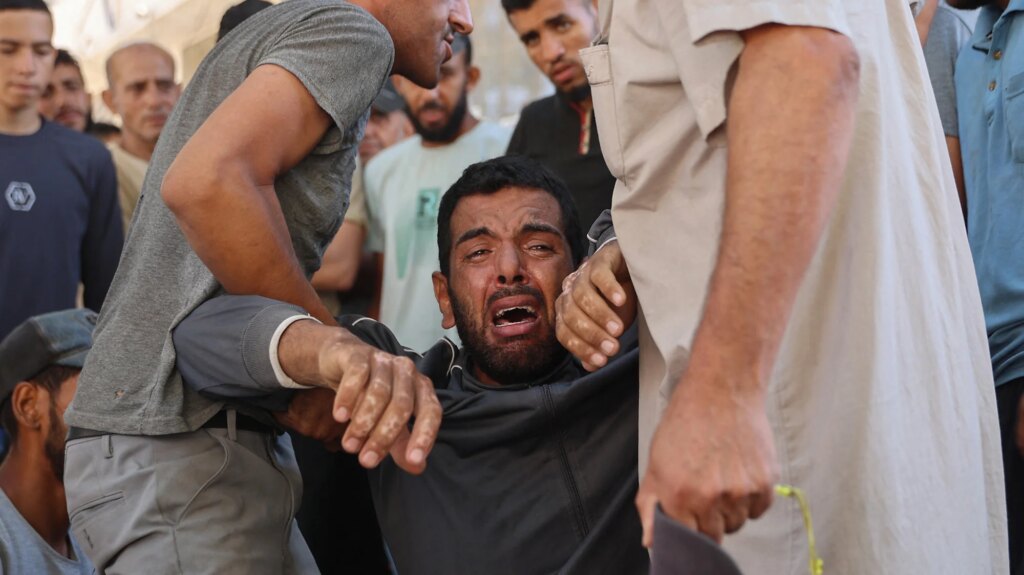The Israeli army has carried out over 26 massacres in less than 48 hours, killing more than 300 Palestinians across the Gaza Strip, the local Government Media Office said on Thursday.
According to the office, the latest attacks targeted densely populated areas, including shelters, displacement centres, leisure spaces, homes, markets, hospitals and aid distribution points.
“The majority of the martyrs are women and children – all unarmed civilians – reflecting the occupation’s deliberate targeting of the most vulnerable groups,” the office said.
Since dawn on Thursday alone, at least 73 Palestinians have been killed in Israeli strikes across the besieged enclave, 33 of whom were seeking humanitarian aid, according to Al Jazeera.
The Palestinian health ministry confirmed that 118 people were killed on Wednesday and 142 the day before.
New MEE newsletter: Jerusalem Dispatch
Sign up to get the latest insights and analysis on
Israel-Palestine, alongside Turkey Unpacked and other MEE newsletters
Meanwhile, the Palestinian Ministry of Endowments and Religious Affairs warned on Wednesday that the more than 600-day war on Gaza has led to a critical shortage of burial space.
“The crisis is worsening due to the occupation’s blockade on the entry of food, medicine, shrouds, construction materials, and other essentials needed for grave preparation,” the ministry said in a statement.
“This is preventing martyrs from being honoured and buried in accordance with Islamic law.”

Palestinians unearth fresh wounds as Gaza’s al-Shifa hospital burials are relocated
Read More »
The Israeli military has reportedly completely or partially destroyed over 40 cemeteries across the besieged strip, further contributing to the shrinking availability of burial space and the depletion of existing graveyards.
The ministry described a “severe shortage” of graves for both martyrs and other deceased individuals.
Forced displacement orders have also reduced available land for new cemeteries, resulting in bodies awaiting emergency burial being temporarily stored in hospitals, schoolyards and even homes.
There has also been a dramatic shortage of burial materials, particularly shrouds used in Islamic funeral rites.
Prices for these items have surged, with the cost of preparing a single grave now estimated at between 700 and 1,000 shekels (approximately $208 to $297).
The ministry has issued an urgent appeal to Arab and Islamic nations, international aid organisations and local initiatives to help provide essential burial supplies, including shrouds, construction materials and other equipment.
US guards shoot at aid seekers
Dozens of those killed in recent days have been aid seekers, according to health officials.
Since late May, Israeli forces have killed at least 600 Palestinians queueing up for limited food distrubted by the controversial US and Israeli-backed Gaza Humanitarian Foundation (GHF).
On Wednesday, the AP revealed that American contractors have also used live ammunition and stun grenades on starving Palestinians attempting to secure aid from these centres.
Two American contractors, speaking to AP, said that hired staff were usually “unqualified, unvetted, heavily armed and seemed to have an open license to do whatever they wished.”
“There are innocent people being hurt. Badly. Needlessly,” one of the contractors guarding aid distribution told the news agency.
In addition to the deadly conditions at distribution points and the overall lack of humanitarian supplies entering Gaza, Palestinians have reported finding nore narcotic pills hidden in aid parcels.
The Government Media Office published photographs showing one such incident, where pills were discovered inside a flour sack in Deir al-Balah.
500lb bomb dropped on cafe
Elsewhere, The Guardian has revealed that a 500lb (230kg) bomb was dropped by Israeli fighter jets on a Gaza City beach cafe earlier this week, which killed least 33 Palestinians.
Fragments identified by ordnance experts – as well as the huge crater left following the strike – show that the parts were that of the US-made MK-82 general purpose 230kg bomb.
Experts say the use of such munition on civilians may constitute a war crime, the report said.
Earlier this week, Middle East Eye’s Maha Hussaini spoke with Mohammad al-Baqa, one of the owners of the cafe, who described the horrific aftermath.
“We gathered a big sack full of human flesh,” he said, underscoring the devastating impact of the strike.
Gaza’s government media office confirmed in a statement that Palestinian photojournalist Ismail Abu Hatab was among those killed. Hatab had worked with several media outlets and curated multiple photography exhibitions about Gaza abroad.
Visual artist Frans al-Salmi was also reportedly killed in the attack.

